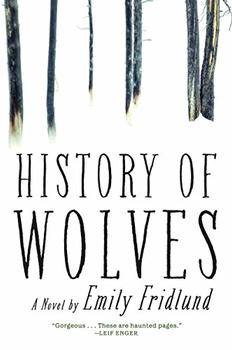Summary | Excerpt | Reading Guide | Discuss | Reviews | Beyond the Book | Readalikes | Genres & Themes | Author Bio

Mr. Grierson treated History Odyssey like we both knew it was a chore. Secretly, I wanted to win. I was determined to see a wolf. Nights, I went out in mukluks, a ski mask, and my father's down jacket, which was redolent with his scents, with tobacco and mildew and bitter coffee. It was like wearing his body while he slept, like earning a right to his presence and silence and bulk. I sat on an old ice bucket near the furthest fish house and sipped boiled water from a thermos. But it was rare for a wolf to be spotted here so late in winter—all I ever saw were distant logs squirming with crows. In the end I had to settle for a dead one. Saturdays, I snowshoed to the Forest Service Nature Center, where I studied the stuffed bitch in the lobby, with her glass eyes and coral nails, her sunken black cheeks pulled back in what looked like a smile. Peg, the naturalist there, pouted when she saw me try to touch the wolf 's tail. "Uh uh," she scolded. She gave me gummy bears and taxidermy techniques, told me how to sculpt eyelids from clay and muscles from polyurethane foam. "Iron the skin, iron the skin," she warned me.
On the morning of the History Odyssey tournament, I sawed a branch from the old pine behind our house. Needles poured in little whik-whik propellers onto the snow. I took the casino bus to Whitewood after school, lugging my wolf poster and branch past the old people from the retirement home, who frowned at me but didn't say anything. In the Whitewood High School auditorium, I propped the branch against the lectern to create the crucial atmosphere. I played a tape of howling wolves on repeat. Though my mouth was dry when I began my speech, I didn't have to use my notes and I didn't rock back and forth like the boy who went before me. I was focused, calm. I pointed to diagrams of pups in different displays of submission, and quoting from a book I said, "But the term alpha—evolved to describe captive animals—is still misleading. An alpha animal may be alpha only at certain times for a specific reason." Those words always made me feel I was drinking something cool and sweet, something forbidden. I thought of the black bitch at the Nature Center, fixed in her posture of doggy friendliness, and I recited that part of my speech over again, slowly this time, like it was an amendment to the Constitution.
Afterward, one of the judges poked his pencil in the air. "But—I have to intervene here. There's something you haven't explained very well. What do wolves have to do with human history?"
It was then that I saw Mr. Grierson by the door. He had his jacket in his arms like he'd just come in, and I watched as he caught the eye of the judge and shrugged. It was the subtlest shift of his shoulders, as if to say, What can you do with kids? What can you do with these teenage girls? I took a deep breath and glared at both of them. "Wolves have nothing at all to do with humans, actually. If they can help it, they avoid them."
They gave me the Originality Prize, which was a bouquet of carnations dyed green for Saint Patrick's Day. Afterward, Mr. Grierson wanted to know if we should load the pine branch in his car with the poster to drive back to school. I was depressed and shook my head. The winner, a seventh-grade girl in a pantsuit, was getting her picture taken with her watercolor rendering of the sinking of the SS Edmund Fitzgerald. I buttoned my coat, then followed Mr. Grierson as he dragged the drooping branch out a side exit. He javelined it upright into a grainy bank of snow. "It's like A Charlie Brown Christmas," he said, laughing. "I want to hang tinsel from it. It's cute."
He bent down to brush stray needles from his slacks, and on impulse I thrust out a hand and brushed as well—swish, swish—against his thigh. He stepped back, did a little shake of his pants, laughed awkwardly. Men can be so ungainly when it comes to sex. I learned that later. But at the time, what I'd done didn't feel sexual. Let me be clear about that. It felt like grooming. Or like coaxing a dog to you, watching its hackles rise and fall, and then you have a pet.
Excerpted from History of Wolves by Emily Fridlund. Copyright © 2017 by Emily Fridlund. Excerpted by permission of Atlantic Monthly Press. All rights reserved. No part of this excerpt may be reproduced or reprinted without permission in writing from the publisher.
It is among the commonplaces of education that we often first cut off the living root and then try to replace its ...
Click Here to find out who said this, as well as discovering other famous literary quotes!
Your guide toexceptional books
BookBrowse seeks out and recommends the best in contemporary fiction and nonfiction—books that not only engage and entertain but also deepen our understanding of ourselves and the world around us.